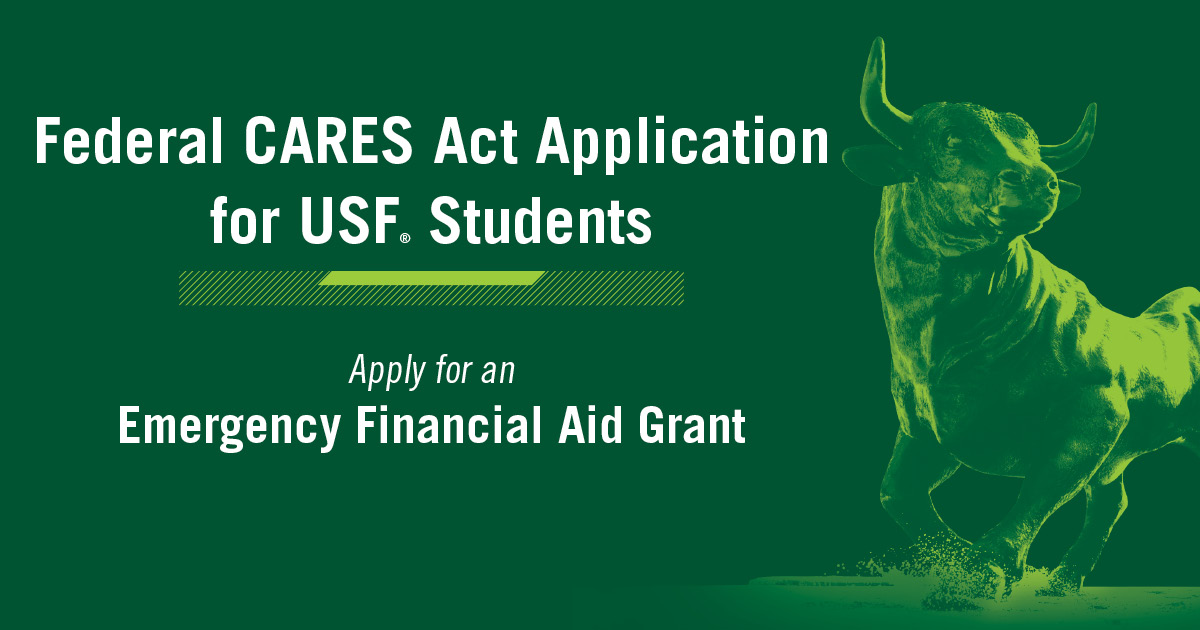Fall CARES Act funds distributed to eligible students

With $5.96 million left to spend on students, USF has started distributing another round of the Coronavirus Aid, Relief and Economic Security (CARES) Act funding this semester to cover necessary expenses such as rent, technology and food.
Out of the $34.8 million received from the CARES Act, $17.4 million is designated to students and the other half to the university’s institutional expenses caused by COVID-19, including technology enhancements, facility enhancements and cleaning /sanitizing. At present, 8,400 students have qualified for the funding and $11.4 million has been distributed so far. Of these students, 6,600 applied for the funding and 4,400 automatically received it from the university, according to Billie Jo Hamilton, the director of university scholarships and financial aid services.
The automatically qualified students still had to prove they were in need of the funding to receive money, just as the students who applied had to do, according to Hamilton.
She also said that students can still apply for funding on the Office of Financial Aid’s website.
“We are still taking applications for fall and spring,” Hamilton said. “We are also pushing out some additional automatic awards for students who had applied in the summer with expenses like food and rent.”
Students who qualified for the funding in the fall were given their allocated money starting the weekend of Sept. 6 to cover both semesters, according to Hamilton. However, there is still funding left over for the 2021 spring semester applicants.
“We have about $2.3 million left for spring,” she said.
The $2.3 million will have to be spent by the end of March and there is no additional funding that is set to be allocated after that. Also, as more funding is distributed in the fall to new applicants, there will be even less money to give out in the spring.
Not all students are eligible for the funding. To qualify, students must be in need of aid as a result of COVID-19. Hamilton said paying for rent, food and technological needs are the three biggest reasons students apply for CARES Act funding.
“We had some students who didn’t have a laptop or computer when we went online, so some students said they needed to have those,” Hamilton said.
To receive funding, students must also provide receipts for what they plan on spending their allocated money on such as rent, a phone bill or other necessities.
Food is an exception to this rule as students do not need to provide a receipt for that expense.
“We allow $400 a month for food,” Hamilton said. “If a student says they need food for a couple months, we will cover that up to $1,000.”
Eligibility also includes taking at least six credit hours, qualifying for federal student aid, being a U.S. citizen and keeping grades up.
“Students must be at least half time [enrolled at USF],” Hamilton said. “Then, the Department of Education came out later and said that they needed to meet certain qualifications to be able to apply for federal student aid. That doesn’t mean they have to take aid or get a Pell Grant.”
If a student is enrolled in all online courses, they can be disqualified from receiving CARES Act funding because of the implication that they shouldn’t have on-campus living expenses.
“However, if they are in an online program but not exclusively online, they can reach out to our office and we can override and let them apply,” she said.
The Office of Financial Aid checks the Free Application for Federal Student Aid (FAFSA) to know whether a student meets these requirements or is disqualified from applying. Without the FAFSA, students can’t even fill out an application, according to Hamilton.
“If we have students who have a need for funding and they haven’t filled out the FAFSA, they still have an opportunity to do that and once the FAFSA comes in they can apply.”
Pell Grant-eligible students who come from lower-income households account for 40 percent of the USF population, according to Hamilton. They were automatically able to get CARES Act funding in spring 2020 and in fall 2020 if they completed their FAFSA.
“They do really well here at USF,” she said. “We are proud of the fact that we are an access institution and are successfully graduating students from low socioeconomic backgrounds.”
To the dismay of many college students, tuition bills don’t qualify as a justifiable expense the CARES Act can cover, according to Hamilton. But, they can receive actual cash for other necessities that could then be spent on loans and bills.
“These funds cannot be used to pay a student’s bill at the university,” she said. “We tried to get everyone’s financial aid paid to cover their bill so they could more quickly and easily get the refunds. If the student still owes us money for tuition but they still have a need for food or rent or whatever expense we approved it for, they can get that money in their pocket.
“We can’t hold money, we have to give it to the student. What the student does after that is up to their discretion.”






